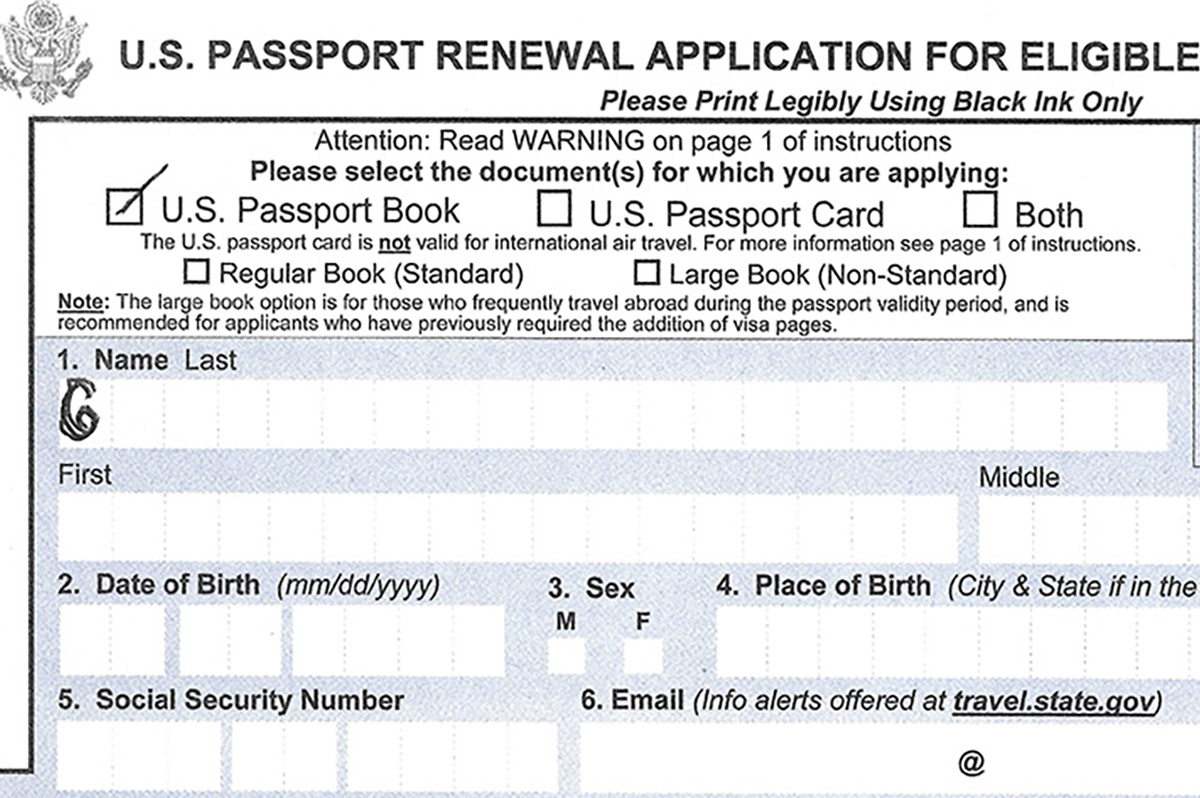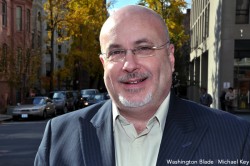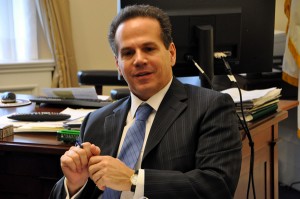National
Gay congressional candidates excel in 2Q fundraising
Baldwin rakes in $2.2 million; Tisei bests Dem incumbent

Gay and lesbian candidates running for Congress posted strong fundraising numbers in the second quarter in a year when more out contenders than ever are making bids for high office.
The Washington Blade examined the second quarter campaign finance reports for the eight candidates seeking office in the U.S. House and U.S. Senate that were endorsed by the Gay & Lesbian Victory Fund. The second quarter numbers represent fundraising for the candidates starting in April through June and were posted recently to the Federal Election Commission website.
The eight endorsed candidates are among 13 identified openly LGBT candidates pursuing seats in the House and Senate throughout the country — an unprecedented number for any election cycle.
In the most high-profile race, lesbian U.S. Senate candidate Tammy Baldwin has been doing well in fundraising in her bid to become the first openly gay U.S. senator. Baldwin took in $2.2 million during the second quarter. That means she has raised $6.7 million this cycle while spending $3.96 million and having $3.5 million in cash on hand.
Technically, she didn’t come out on top in comparison to one of her Republican opponents. Eric Hovde, a hedge fund manager who recently entered the race, posted $2,494,211 for the second quarter. But Hovde, whose net worth has been estimated at $58 million, has spent millions on his own campaign and spent $3.5 million to make his name more well known. Others in the race came out behind: former Wisconsin Gov. Tommy Thompson raised $834,000, former congressman and gubernatorial candidate Mark Neumann raised $733,450 and State Assembly Speaker Jeff Fitzgerald raised $41,033.
The race between Baldwin and her potential Republican opponents appears tight. According to data published last month from Public Policy Polling, she’s in a dead heat with Novde, who leads her 45-44, and Thompson, whom she ties 45-45. Baldwin leads Neumann by 45-41 and Fitzgerald 46-42.
Perhaps the most surprising numbers come from Richard Tisei, a gay Republican former state legislator in Massachusetts, who raised $571,371 in the second quarter in his bid to represent Massachusetts’ 6th congressional district. That means he outraised Rep. John Tierney (D-Mass.), who raised $421,944 — even though he’s an incumbent Democrat running in a heavily “blue” state.
In a statement, Tisei, who outraised Tierney in the first quarter of 2012, thanked donors.
“I am consistently impressed with the strong support I am receiving from individual donors in support of my candidacy,” Tisei said. “In my wildest dreams, I wouldn’t have imagined that so many people would be supporting our message of change with their pocketbooks — particularly in these very tough economic times.”
The fundraising numbers for the second quarter mean Tisei has raised $1,237,000 thus far this cycle, has spent $435,410 and has $802,000 in cash on hand. Comparatively, Tierney has raised $1,325,650 this cycle, has spent $820,875 and has $693,000 in cash on hand.
On Wednesday, the D.C. newspaper Roll Call shifted the status of the race from “leans Democrat” to “toss-up.” The race is becoming competitive, in part, because Tierney, an eight-term U.S House member, has been under scrutiny because of controversy involving his family. Tierney’s brother-in-law, Daniel Eremian, was convicted of federal racketeering charges related to his operation of an illegal offshore casino, and Tierney’s wife was sent to jail for tax fraud related to this operation.
Tierney has a strong pro-LGBT record in the U.S. House: he voted in favor of “Don’t Ask, Don’t Tell” repeal, hate crimes protections legislation and a version of the Employment Non-Discrimination Act in addition to voting against the Federal Marriage Amendment.
Similarly strong numbers were posted in the second quarter by Mark Pocan, a gay Wisconsin Assembly member who’s seeking to represent Wisconsin’s 2nd congressional district. Baldwin is vacating the seat to run for Senate.
But Pocan is in a different situation because he still needs to win the Democratic primary, which is set for Aug. 14, and other Democrats are seeking the nomination to represent the party in the general election. Pocan raised $250,000 in the second quarter, besting his most serious competitor, Kelda Helen Roys, another state legislator in Wisconsin, who raised $130,833.
In a statement, Pocan said he accepted contributions from more than 3,300 donors over the course of his campaign, and 80 percent of donations came in increments of $100 or less.
“I am truly grateful for the outpouring of support from the District 2 community,” Pocan said. “I’ve met and talked to voters from Beloit to Baraboo, and it’s clear my message of progressive values with real results resonates with people.”
The second quarter numbers mean Pocan has raised $734,550 over the course of his campaign, has spent $280,635 and has $454,000 in cash on hand. Meanwhile, Roys has raised $392,393, spent $130,833 and has $190,120 in cash on hand.
Not all gay candidates are faring as well. Sean Patrick Maloney, didn’t raise as much as incumbent Rep. Nan Hayworth (R-N.Y.) in his bid to represent New York’s 18th congressional district. Maloney, who in June won the Democratic primary, raised $319,000 in the second quarter, while Hayworth took in $459,000.
Tim Persico, campaign manager for Maloney, said special interests were the reason his boss didn’t raise as much as the incumbent Republican in the past few months, but said he’s still in good position to win.
“Sean Patrick Maloney doesn’t have the same profitable relationship with PACs and corporate lobbyists that brought Congresswoman Hayworth over a million dollars, but the outpouring of support from friends, family and even complete strangers has put him in a position to win,” Persico said.
Support from the LGBT community is coming from both sides in this race. Hayworth, who has a gay son, Will Hayworth, has been seen as a friend to the LGBT community since she took office at the start of last year. For example, she was among five Republicans to vote against a recent measure to reaffirm the Defense of Marriage Act when it came to the floor last month.
One of the gay U.S. House members seeking re-election — and who’s also facing a serious challenge in the primary and general election — also came out on top in fundraising last quarter. Rep. David Cicilline (D-R.I.), who last year became the newest openly gay member of Congress, raised $302,000 in the second quarter.
But his opponents aren’t too far behind. Anthony Gemma, a businessman, is Cicilline’s main challenger in the Democratic primary, which is set for Sept. 11, and raised $243,000 in the second quarter. The Republican in the race, Brendan Doherty, the Rhode Island State Police’s former superintendent, raised $221,711.
Cicilline is facing a complicated road to re-election because the city that he governed as mayor prior to winning election to the U.S. House, Providence, R.I., is facing financial problems. A report commissioned by the City Council last year blamed his administration for a lack of transparency and for making a series of moves – like tapping into Providence’s rainy-day fund – without councilors’ approval. The lawmaker apologized in April, saying he should have been more forthright about the financial condition of the city.
Polls are showing Cicilline could be in danger of losing the Democratic nomination. A poll from local TV affiliate WPRI published in May of 302 likely Democratic primary voters had Cicilline leading with 40 percent and Gemma following close behind at 36 percent — and 20 percent still undecided.
So far this cycle, Cicilline has raised $1,570,486, spent $771,723 and has $836,325 in cash on hand. At the same time, Doherty has raised $990,882, spent $321,532 and has $669,350 in cash on hand, while Gemma has raised $990,882, spent $87,071 and has $343,040 in cash on hand.
The bisexual lawmaker seeking to represent Arizona’s 9th congressional district is also coming out on top of a crowded field of a half dozen candidates seeking to win this newly created seat. Kyrsten Sinema, who’s bisexual and a state legislator, raised $367,554 in the second quarter. That’s above her most serious competitor in the primary set for Aug. 28, Andrei Cherny, who’s a former state party chair endorsed by former President Clinton. Cherny took in $301,895 during the same period.
In total this cycle, Sinema has raised $626,288, spent $267,492 and has $358,796 in cash in hand. In comparison, Cherny has raised $732,973, spent $263,913 and has $469,060 in cash on hand.
But the gay candidate didn’t come out on top in California’s 41st congressional district. Mark Takano, a school teacher and member of the Riverside Community College District’s Board of Trustees, raised $256,965, while his opponent, Riverside County Supervisor John Tavaglione, raised $337,667. Takano is seeking to become the first openly gay person of color to serve in the U.S. House in this newly created Democratic-leaning district.
So far this cycle, Takano has raised $758,156, spent $517,138 and has $241,093 in cash on hand. Meanwhile, Tavaglione has raised $790,027, spent $338,186 and has $451,991 in cash on hand.
Rep. Jared Polis (D-Colo.), who if re-elected would become the most senior openly gay member of the U.S. House, raised $59,503 in the second quarter. Those numbers put him at $848,000 in total for fundraising this cycle and leave him with $347,000 in cash on hand. An incumbent running in a safe Democratic seat, he’s not expected to face serious competition in his bid for re-election.
CORRECTION: An earlier version of this article incorrectly referred to Rep. Nan Hayworth as Nan Hunter. The name of Tim Persico was also misspelled. The Blade regrets the error.
U.S. Federal Courts
Second federal lawsuit filed against White House passport policy
Two of seven plaintiffs live in Md.

Lambda Legal on April 25 filed a federal lawsuit on behalf of seven transgender and nonbinary people who are challenging the Trump-Vance administration’s passport policy.
The lawsuit, which Lambda Legal filed in U.S. District Court for the District of Maryland in Baltimore, alleges the policy that bans the State Department from issuing passports with “X” gender markers “has caused and is causing grave and immediate harm to transgender people like plaintiffs, in violation of their constitutional rights to equal protection.”
Two of the seven plaintiffs — Jill Tran and Peter Poe — live in Maryland. The State Department, Secretary of State Marco Rubio, and the federal government are defendants.
“The discriminatory passport policy exposes transgender U.S. citizens to harassment, abuse, and discrimination, in some cases endangering them abroad or preventing them from traveling, by forcing them to use identification documents that share private information against their wishes,” said Lambda Legal in a press release.
Zander Schlacter, a New York-based textile artist and designer, is the lead plaintiff.
The lawsuit notes he legally changed his name and gender in New York.
Schlacter less than a week before President Donald Trump’s inauguration “sent an expedited application to update his legal name on his passport, using form DS-5504.”
Trump once he took office signed an executive order that banned the State Department from issuing passports with “X” gender markers. The lawsuit notes Schlacter received his new passport in February.
“The passport has his correct legal name, but now has an incorrect sex marker of ‘F’ or ‘female,'” notes the lawsuit. “Mr. Schlacter also received a letter from the State Department notifying him that ‘the date of birth, place of birth, name, or sex was corrected on your passport application,’ with ‘sex’ circled in red. The stated reason was ‘to correct your information to show your biological sex at birth.'”
“I, like many transgender people, experience fear of harassment or violence when moving through public spaces, especially where a photo ID is required,” said Schlacter in the press release that announced the lawsuit. “My safety is further at risk because of my inaccurate passport. I am unwilling to subject myself and my family to the threat of harassment and discrimination at the hands of border officials or anyone who views my passport.”
Former Secretary of State Antony Blinken in June 2021 announced the State Department would begin to issue gender-neutral passports and documents for American citizens who were born overseas.
Dana Zzyym, an intersex U.S. Navy veteran who identifies as nonbinary, in 2015 filed a federal lawsuit against the State Department after it denied their application for a passport with an “X” gender marker. Zzyym in October 2021 received the first gender-neutral American passport.
Lambda Legal represented Zzyym.
The State Department policy took effect on April 11, 2022.
Trump signed his executive order shortly after he took office in January. Germany, Denmark, Finland, and the Netherlands are among the countries that have issued travel advisories for trans and nonbinary people who plan to visit the U.S.
A federal judge in Boston earlier this month issued a preliminary injunction against the executive order. The American Civil Liberties Union filed the lawsuit on behalf of seven trans and nonbinary people.
Federal Government
HHS to retire 988 crisis lifeline for LGBTQ youth
Trevor Project warns the move will ‘put their lives at risk’

The U.S. Department of Health and Human Services is planning to retire the national 988 crisis lifeline for LGBTQ youth on Oct. 1, according to a preliminary budget document obtained by the Washington Post.
Introduced during the Biden-Harris administration in 2022, the hotline connects callers with counselors who are trained to work with this population, who are four times likelier to attempt suicide than their cisgender or heterosexual counterparts.
“Suicide prevention is about risk, not identity,” said Jaymes Black, CEO of the Trevor Project, which provides emergency crisis support for LGBTQ youth and has contracted with HHS to take calls routed through 988.
“Ending the 988 Suicide and Crisis Lifeline’s LGBTQ+ youth specialized services will not just strip away access from millions of LGBTQ+ kids and teens — it will put their lives at risk,” they said in a statement. “These programs were implemented to address a proven, unprecedented, and ongoing mental health crisis among our nation’s young people with strong bipartisan support in Congress and signed into law by President Trump himself.”
“I want to be clear to all LGBTQ+ young people: This news, while upsetting, is not final,” Black said. “And regardless of federal funding shifts, the Trevor Project remains available 24/7 for anyone who needs us, just as we always have.”
The service for LGBTQ youth has received 1.3 million calls, texts, or chats since its debut, with an average of 2,100 contacts per day in February.
“I worry deeply that we will see more LGBTQ young people reach a crisis state and not have anyone there to help them through that,” said Janson Wu, director of advocacy and government affairs at the Trevor Project. “I worry that LGBTQ young people will reach out to 988 and not receive a compassionate and welcoming voice on the other end — and that will only deepen their crisis.”
Under Trump’s HHS secretary, Robert F. Kennedy, Jr., the agency’s departments and divisions have experienced drastic cuts, with a planned reduction in force of 20,000 full-time employees. The Substance Abuse and Mental Health Services Administration has been sunset and mental health services consolidated into the newly formed Administration for a Healthy America.
The budget document reveals, per Mother Jones, “further sweeping cuts to HHS, including a 40 percent budget cut to the National Institutes of Health; elimination of funding for Head Start, the early childhood education program for low-income families; and a 44 percent funding cut to the Centers for Disease Control, including all the agency’s chronic disease programs.”
U.S. Supreme Court
Supreme Court hears oral arguments in LGBTQ education case
Mahmoud v. Taylor plaintiffs argue for right to opt-out of LGBTQ inclusive lessons

The U.S. Supreme Court on Tuesday heard oral arguments in Mahmoud v. Taylor, a case about whether Montgomery County, Md., public schools violated the First Amendment rights of parents by not providing them an opportunity to opt their children out of reading storybooks that were part of an LGBTQ-inclusive literacy curriculum.
The school district voted in early 2022 to allow books featuring LGBTQ characters in elementary school language arts classes. When the county announced that parents would not be able to excuse their kids from these lessons, they sued on the grounds that their freedom to exercise the teachings of their Muslim, Jewish, and Christian faiths had been infringed.
The lower federal courts declined to compel the district to temporarily provide advance notice and an opportunity to opt-out of the LGBTQ inclusive curricula, and the 4th U.S. Circuit Court of Appeals determined that the parents had not shown that exposure to the storybooks compelled them to violate their religion.
“LGBTQ+ stories matter,” Human Rights Campaign President Kelley Robinson said in a statement Tuesday. “They matter so students can see themselves and their families in the books they read — so they can know they’re not alone. And they matter for all students who need to learn about the world around them and understand that while we may all be different, we all deserve to be valued and loved.”
She added, “All students lose when we limit what they can learn, what they can read, and what their teachers can say. The Supreme Court should reject this attempt to silence our educators and ban our stories.”
GLAD Law, NCLR, Family Equality, and COLAGE submitted a 40-page amicus brief on April 9, which argued the storybooks “fit squarely” within the district’s language arts curriculum, the petitioners challenging the materials incorrectly characterized them as “specialized curriculum,” and that their request for a “mandated notice-and-opt-out requirement” threatens “to sweep far more broadly.”
Lambda Legal, the Leadership Conference on Civil and Human Rights, PFLAG, and the National Women’s Law Center announced their submission of a 31-page amicus brief in a press release on April 11.
“All students benefit from a school climate that promotes acceptance and respect,” said Karen Loewy, senior counsel and director of constitutional law practice at Lambda Legal. “Ensuring that students can see themselves in the curriculum and learn about students who are different is critical for creating a positive school environment. This is particularly crucial for LGBTQ+ students and students with LGBTQ+ family members who already face unique challenges.”
The organizations’ brief cited extensive social science research pointing to the benefits of LGBTQ-inclusive instruction like “age-appropriate storybooks featuring diverse families and identities” benefits all students regardless of their identities.
Also weighing in with amici briefs on behalf of Montgomery County Public Schools were the National Education Association, the ACLU, and the American Psychological Association.
Those writing in support of the parents challenging the district’s policy included the Center for American Liberty, the Manhattan Institute, Parents Defending Education, the Alliance Defending Freedom, the Trump-Vance administration’s U.S. Department of Justice, and a coalition of Republican members of Congress.
-

 Virginia2 days ago
Virginia2 days agoYoungkin calls on gay Va. GOP LG candidate to exit race over alleged ‘porn’ scandal
-

 Commentary4 days ago
Commentary4 days agoA conversation about queers and class
-

 Kenya4 days ago
Kenya4 days agoKenya Red Cross-owned hotel to host anti-LGBTQ conference
-

 Opinions3 days ago
Opinions3 days agoNavigating employer-sponsored health insurance, care














